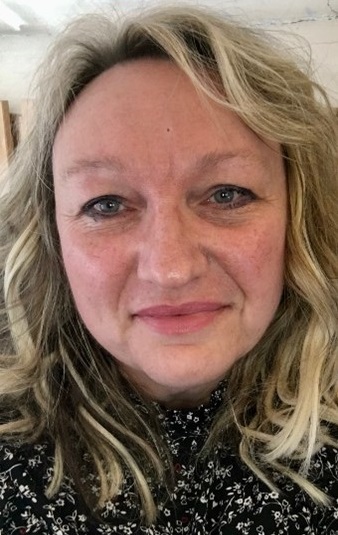 Hello, my name is Jayne Heley
Hello, my name is Jayne Heley
I have been working in the NHS for over 30 years and in the last four years in the NHS England / Improvement Personalised Care Group. During this time, I have seen how we can achieve incredible things, every day, for people who need NHS care.
Human beings are complex, and whilst we all share common traits, biology, and anatomy, we also have our own unique needs and preferences. If we are serious about tackling the health inequalities that various people and communities face, we also need to think beyond a one size fits all approach to care and support.
This is where personalised care comes in – giving people choice and control over the way their care is planned and delivered – improving skills, knowledge and confidence and in doing so delivering better outcomes for people, their families and carers, and the NHS.
Personalised care helps to improve health and wellbeing, have better ‘what matters to me” conversations and reduce needs on NHS services.
The six components which make up personalised care are:
- Shared decision making changing the clinical conversation from what’s wrong with you to what matters to you
- Patient choice including the legal rights that patients have to express their preferences for elective care
- Personalised care and support planning enabling looking holistically at people’s care and support needs alongside their strengths and individual preferences or goals
- Personal health budgets giving people improved choice, within an agreed care plan, whilst reducing cost to the NHS
- Self-management support creating the circumstances where people have increased skills knowledge and confidence to manage their care, through interventions such as health coaching, health literacy and activation
- Social prescribing connecting people to support within their local communities and enables the NHS to address the growing number of patients who present with non-medical issues such as debt, housing, relationships, loneliness, and social isolation.
We are delivering this through the implementation of the Comprehensive Model of Personalised Care and nationally so far, 2.8 million people have benefitted against the NHS Long Term Plan target of 2.5 million people benefitting by 2024 (accurate April 2022).
Due to the dedicated work of teams across the whole country and across West Yorkshire we have been embedding personalised care interventions within clinical pathways, including in maternity, cancer, diabetes prevention and through the delivery of primary care services, elective care reform and community health. Personalised care is also being implemented alongside approaches to population health management and health inequalities to enable us to approach the complex challenges facing people.
The Secretary of State for Health and Social Care in a Road to Recovery speech cited personalisation as one of three key priorities for a future NHS, alongside performance and preventing ill health. He established an expectation that we will reach four million people by 2024, and we will be setting out how we will do this within the NHS Long Term Plan update.
We all have a role to play in ensuring personalised care can become a universal reality within the NHS. It provides the type of care that we would all want to see for ourselves, our family, and friends.
I want to take this opportunity in thanking all colleagues across West Yorkshire and to those who have supported the work so far in the long-term health conditions and personalisation team in the West Yorkshire Health and Care Partnership. You have shown great leadership and its great working with and alongside you.
Have a good weekend everyone
Jayne
 Hello, my name is Bebhinn, Senior Programme Manager for Long Term Conditions at the Partnership where I have been supporting the work of the West Yorkshire and Harrogate Integrated Stroke Delivery Network (ISDN).
Hello, my name is Bebhinn, Senior Programme Manager for Long Term Conditions at the Partnership where I have been supporting the work of the West Yorkshire and Harrogate Integrated Stroke Delivery Network (ISDN).
The NHS Long Term Plan recognises the growing impact of stroke in England. Stroke is the largest cause of disability in the UK and the fourth biggest killer. In West Yorkshire and Harrogate, around 3000 people a year have a stroke with two thirds of stroke survivors left with some form of physical, mental, or emotional disability.
Stroke is now part of the Partnership’s Clinical and Professional Directorate. This provides greater opportunities to work together to embed personalised care approaches, strategies to support carers of those who have suffered a stroke and greater connectivity between stroke and other long term conditions such as diabetes.
The aim of the West Yorkshire and Harrogate ISDN is to bring together stroke services across the area to deliver the best possible care throughout the whole stroke pathway by improving clinical outcomes, patient experience and patient safety.
The ISDN brings together key stakeholders, using a collaborative approach, to deliver the National Stroke Service Model (2021) which focuses on helping to prevent people from suffering a stroke, improving diagnosis and access to treatment and increasing the availability of high-quality rehabilitation to rebuild patients’ lives after a stroke.
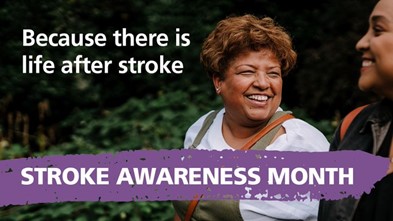 May is stroke awareness month and it’s a great opportunity to share some of the work that is happening across the area.
May is stroke awareness month and it’s a great opportunity to share some of the work that is happening across the area.
As an ISDN we still have a long way to go to improve access to Thrombolysis and Thrombectomy services, we are working with neighbouring ISDNs in Humber Coast and Vale, North East and North Cumbia and South Yorkshire and Bassetlaw to support a quality review into thrombectomy delivery. The Quality Reviews are a collaboration between Getting It Right First Time (GIRFT), the National Stroke Programme at NHSE, The Sentinel Stroke National Audit Programme (SSNAP), Specialised Commissioning and the Promoting Effective and Rapid Stroke Care (PEARS) research programme.
The quality review will support the ISDN in achieving the Long Term Plan commitment of expanding mechanical thrombectomy, from 1% to 10% of stroke patients, ensuring that patients receive high quality care and treatment. The review will support ISDNs to share data and evidence about current delivery and learn more about key challenges faced by services.
We have also been working with services to review data from SSNAP to understand what is working well, what areas we can improve on and how we can work together and learn from each other to realise our ambition to reach a SSNAP level Score A (the highest score measuring quality) in all key domains across our area.
Working with people who have had a stroke and carers really helps the ISDN to focus on what needs to be done to improve outcomes and patient experience. We have been working with our patient and carer representative group, our clinical rehabilitation lead, the North East and Yorkshire Leadership Academy and New Citizenship Project to co-design a stroke pathway. Two workshops were held in March and April with a range of stakeholders including stroke survivors, carers, clinicians and the voluntary community and social enterprise (VCSE) organisations. With support from the communications and engagement team at the Partnership, we have developed a booklet to be shared in the community to encourage and support people to apply to join the patient and carers representative group.
This stroke awareness month I have had the chance to reflect on the excellent work that has taken place in stroke services so far, the passion and dedication our stakeholders have demonstrated to improving the lives of people in West Yorkshire and Harrogate and the opportunities ahead as an ISDN and to evolve and lead, drive transformational change at scale that is supported and informed by priorities at place and national good practice.
Have a lovely weekend
Bebhinn


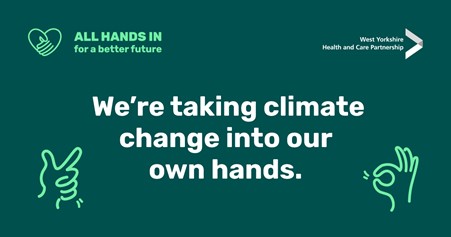 This week we launched our new climate change campaign urging over 100,000 staff and volunteers to be ‘All hands in for a better future.’ We know climate change poses a major threat to everyone’s future. That’s why we’re committing to making fundamental changes to the way we work, through increased investment, mitigation, and culture change throughout our health and care system. The campaign encourages us all to be aware of how individual actions can impact on the climate and how decreasing carbon emissions is good for health. In the video below, our healthcare leaders ask colleagues to promise to do one simple thing of their choosing to reduce the impact on the environment and make a pledge on the campaign’s website:
This week we launched our new climate change campaign urging over 100,000 staff and volunteers to be ‘All hands in for a better future.’ We know climate change poses a major threat to everyone’s future. That’s why we’re committing to making fundamental changes to the way we work, through increased investment, mitigation, and culture change throughout our health and care system. The campaign encourages us all to be aware of how individual actions can impact on the climate and how decreasing carbon emissions is good for health. In the video below, our healthcare leaders ask colleagues to promise to do one simple thing of their choosing to reduce the impact on the environment and make a pledge on the campaign’s website: 
 The Partnership’s
The Partnership’s 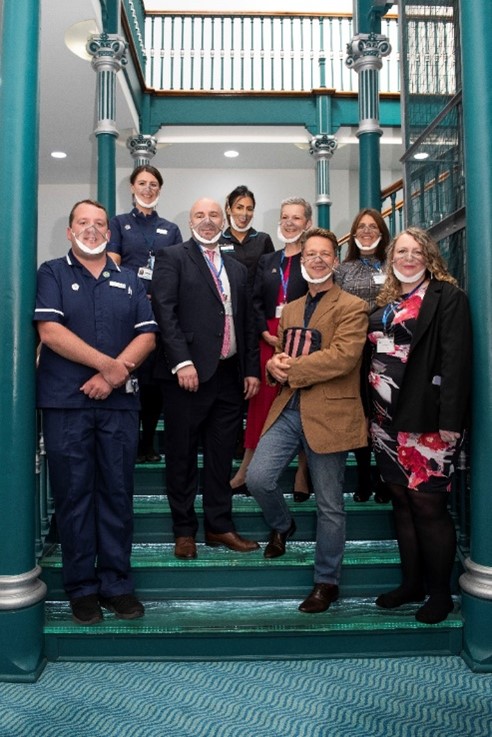 A new national nursing and midwifery examination centre has officially opened at Leeds Teaching Hospitals NHS Trust. The new NMC Competence Test Centre, based at Leeds General Infirmary, will host up to 7,000 nurses, midwives and nursing associates each year for their ‘OSCE’
A new national nursing and midwifery examination centre has officially opened at Leeds Teaching Hospitals NHS Trust. The new NMC Competence Test Centre, based at Leeds General Infirmary, will host up to 7,000 nurses, midwives and nursing associates each year for their ‘OSCE’ 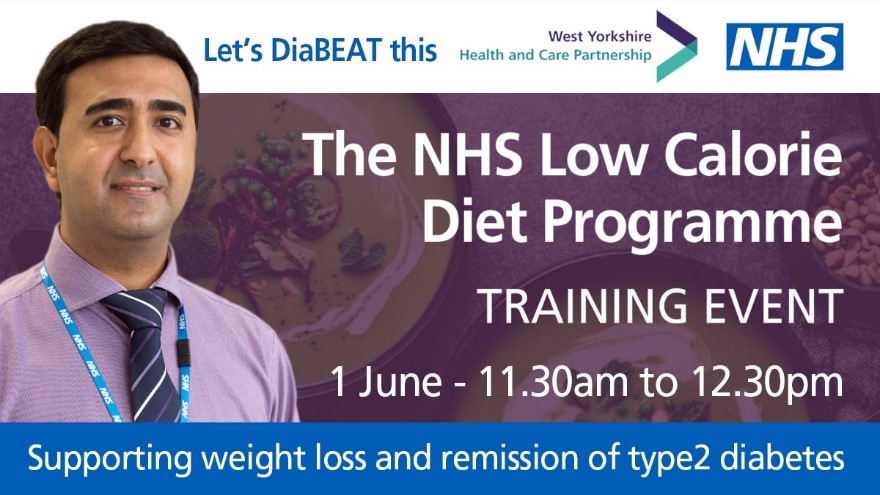 We are holding an additional
We are holding an additional